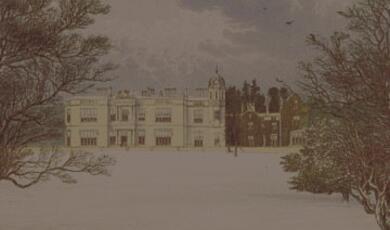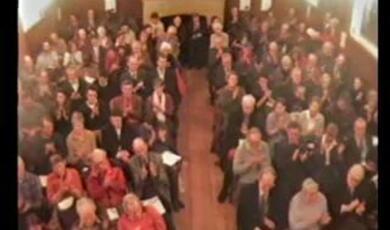Ancient Greek and Roman Libraries
Share
- Details
- Transcript
- Audio
- Downloads
- Extra Reading
Although Mesopotamian civilisations had assembled texts, the ancient Greeks brought the idea of the universal book collection to its near-legendary consummation in the Library of Alexandria, which edited and housed thousands of papyrus rolls on every subject and attracted brilliant scholars from all over the ancient world. But there were many other libraries, serving also as scientific laboratories, public record offices, restaurants, mausoleums and even baths. This illustrated lecture investigates their history and the continuing influence on our modern world.
Download Transcript
Libraries are commonly regarded as serious, even austere environments, so it may come as a surprise that it is in a comedy that the earliest literary response to a library occurs. The library belongs to the hyper-intellectual tragedian Euripides, and he is visited by the peasant farmer protagonist in Aristophanes’ Acharnians, first performed in Athens in the late winter of 425 BC. In this wonderful episode we can see the very birth of the comic image of the library as a place inhabited by cerebral individuals who seem inherently funny to ordinary people of common sense. But the scene also demonstrates how the idea of book assemblage could stimulate artistic inventiveness.
The finds at Qumran alone have revealed the physical, material realities of the painstaking ancient process of book reproduction—not just in the Dead Sea Scrolls themselves, but in the ink wells and even the plaster coverings of the desks at which the scribes laboured. But my discussion today is about the idea of the library (which we inherit more or less directly from the ancient Mediterranean and Near Eastern worlds), rather than those nuts and bolts, or the cataloguing systems which the poet and librarian Callimachus pioneered more than two millennia before Melvil Dewey created decimal classification. The subject-matter is enormous, even if we focus on the libraries of the pagan Greeks and Romans, to the exclusion of the Babylonians and Assyrians from whose library organisation systems they learned, or of the Phoenicians, Egyptians, and Jews, let alone the early Christians, who inherited their basic library building plan from their pagan precursors.
The erudite Varro in the mid-first century BCE compiled a monumental study of libraries, de Bibliothecis. Varro was an encyclopaedist, whom Julius Caesar appointed public librarian in Rome in 47 BCE. He was the only known ancient author to be granted the privilege of having a bust in his likeness installed in one of the main Roman libraries while he was still alive. His treatise may have been commissioned as an ideological accompaniment to Caesar’s quest to expand the incipient Roman realm, ‘to connect world-literature with the world-empire’. Even as early as the first century BCE, before the surge in library-building under the high Empire, notably under the Emperor Trajan in the early 2nd century CE, Varro’s project in compiling a universal historical treatise on libraries would have daunted anyone but him. And the history of pagan libraries was to continue for several centuries thereafter, until 543 CE, when the Emperor Justinian finally closed down the temple of Isis at Philae in Egypt, built under the same Ptolemies who built the library at Alexandria. Behind the massive colonnade of the Philae temple at least one massive room had functioned as a library.
The papyrus on which most ancient Greek and Latin books were recorded, as an organic material, was vulnerable to rotting, wear and tear. Yet forgers sometimes stained brand new papyri to make them look like authentic ancient texts. The ancients laughed at the difference between the materialistic bibliophile who collected books as commodities, and the cultured person who actually understood their contents. Lucian wrote a diatribe Against the Ignorant Book-Collector. This rich man buys shiploads of books, and endlessly glues and trims them, applying cedar-oil and saffron, and keeping them in purple silk and leather cases. But he is deluding himself because ‘he thinks that by the multitude of books’ he can rectify his ‘deficient education’. The nouveau-riche Trimalchio whose banquet is described by Petronius boasts that his libraries rivalled those of the Emperor. Seneca confirms that some rich men did indeed use banquets as opportunities to display books which they had never studied.
Some of the most important to advance in ancient intellectual life were the specialist libraries such as the collection of theatre scripts in the state depository at Athens, organised by the theatre-loving statesman Lycurgus. Others collected the writings of members of a particular philosophical school, such as the Stoics, whose centre of learning was on the island of Rhodes. There the great Stoic polymath scholar Posidonius practised during the first half of the first century BCE. Pompey, Caesar, Cicero and Brutus all studied there. Rhodes was also renowned as a centre of astronomical studies, a particular interest of the bookworm Emperor Tiberius, who spent several years on the island.
Libraries varied massively in scale as well as contents. Some private libraries were large enough to accommodate the leading lights of a whole philosophical school comfortably, such as the ‘Villa of the Papyri’ found in 1752 at Herculaneum. This was the vacation villa of no less a figure than Julius Caesar’s father-in-law Calpurnius Piso, where the famous philosopher Philodemos of Gadara supervised his patron’s magnificent collection of Epicurean texts. Multi-spectral imaging has allowed the remains of some of them, burnt by same volcanic eruption which destroyed Pompeii in 79 CE, to be deciphered. On the other hand there were small book collections which could be carried around in handy containers, like this portable scrinium or cista on a Roman mosaic in Tunis. It probably held the ‘parts’ or whole plays in which the actor portrayed here specialised; the seated man may be an author who has collaborated with the actor or, more likely, his patron. In between these extremes there were small private libraries in which solitary misanthropes hid from the world; Xenophon remarks on the book collection amassed by the philosopher Euthydemus (Mem. 4.2.8).
The first public library may have been established by Clearchus, tyrant of Heraclea on the south coast of the Black Sea, who died in 353 BCE. This Pontic despot had been educated at Athens by the two leading intellectuals of the time, Plato and Isocrates, and the tradition that he built a library is connected with the ancient perception that the Greeks of the Black Sea were anxious to avoid the accusation that they lived in a cultural backwater. But it was the people of the first two generations after Alexander the Great who saw the establishment of the first libraries which can be described as ‘public’ in the modern sense, even though scholars disagree on the nature and degree of public access, especially given that literacy rates in many ancient cities may not have exceed ten to twenty per cent of the population. Moreover, we are not in a position to tell whether most public libraries allowed borrowing of books at all, even to respected and trusted members: an inscription believed to have belonged to the library which Trajan built at Athens in 132 CE specifies its opening hours and proclaims, ‘No book shall be taken out. We have sworn it!’ The first great public libraries were set up in the kingdoms established by Alexander’s successors, notably the Ptolemies’ near-legendary library in the Egyptian-Greek city of Alexandria, founded by the Macedonian conqueror himself in 331 BCE. He had been instructed on the precise location by the shade of Homer, who visited him in a dream.
The Alexandrian library was said to have been designed with the assistance of the Athenian Peripatetic philosopher Demetrius of Phaleron, taught by Aristotle’s student Theophrastus. The library was either adjacent to or (at least originally) constituted part of the Alexandrian ‘Museum’ (Mouseion or ‘temple of the Muses’); other book collections, of all sizes, were often attached to or housed within temples. Indeed, in the late fourth century, Demetrius had educated himself by reading Aristotle’s own books, assembled in another Mouseion at Athens. Some libraries could be housed in public baths, which served as the ancient equivalent of a ‘leisure centre’, where social and sexual transactions could be conducted; Caracalla’s imposing baths, built at Rome in the second decade of the third century CE, contained one room of texts in Greek and another one in Latin. Some libraries also served as public records offices, as bookshops, restaurants, and scientific laboratories. The library of Pantainos at Athens supported itself by renting out shops within the building complex, including one to a marble mason. Libraries under Augustus could host meetings of the Roman Senate; large ones with a colonnade often provided a place to take a lengthy stroll. Libraries penetrated the unconscious mind to feature in people’s dreams: Tiberius dreamt about the vast and beautiful statue of Apollo Temenites, which he brought from Syracuse to adorn the library of the New Temple (Suetonius, Life of Tiberius). You could build a library to serve as a sepulchre for your eminent family or forebears. Celsus buried his father, who had been governor of the province (Roman Asia), in a lead coffin, encased within a marble sarcophagus which he had set into a vaulted recess of the Ephesus library; Dio Chrysostom interred his wife and child in the courtyard of the library at Prusa in north-western Turkey. Libraries could even be used in courtship rituals: in his attempt to impress Cleopatra, Mark Antony made her a present of the great library of Pergamum, all 200,000 volumes of it, collected by the ancestral rivals of Cleopatra’s Ptolemy family—the Attalids.
We have dug up large library buildings with no books left, like the beautiful Roman provincial library excavated in the grid-city at Timgad in Algeria by the French in the early 20th century. This became the colonial set for avant-garde Modernist actresses from the Comedie Francaise, such as Mme. Silvaine, who performed a version of Sophocles’ Electra there in 1907. We have dug up a rubbish dump containing whole libraries, but not a single brick, at the site of the ancient Greek town of Oxyrhynchus on a branch of the Nile in Upper Egypt. The ‘Oxyrhynchus papyri’ include some of the contents of at least one impressive Oxyrhynchite private book collection, which contained copies of esteemed poetic works such as Euripides’ Hypsipyle, Pindar’s Paeans and an extensive collection of prose writers. On the other hand, we know about some fascinating libraries even though they have disappeared altogether. One example is of course the Library of Alexandria, but another, later and more typical instance is the library which Pliny the Younger funded lavishly at Comum (now Como) in northern Italy, north of Milan, in about 97 CE.
We know about Pliny’s library because there survives an inscription recording his benefactions to the town, along with a letter to a friend about it, which accompanied a copy of the speech he delivered to town magistrates at its inauguration. The speech itself does not survive, but the letter does. Now this Pliny was a rich and well-regarded imperial administrator and senator. He describes some of the other themes the missing oration addressed: the presence of the library would itself encourage his townsmen in virtuous studies; his own contempt of riches and freedom from the chains of avarice; the commendation his benefaction deserved because it was the result not of a passing fancy but of deliberate resolution; his decision to bestow upon his townsmen a library rather than shows or gladiators. This last point is interesting, because another inscription shows that a city’s populace might have reason to hope that the sort of benefactor who gave them a library might also donate gladiators: one such man capped a gift of a library to his grateful public with no fewer than twelve pairs of these violent public entertainers!
Pliny’s seems to have been the first library ever donated by a private individual to a town in the Roman Empire, but it preceded ‘a spate of library-building throughout.’ These benefactions signalled the importance of an individual statesman, from a particular landowning senatorial family, and his role in fostering what was (in the case of Comum) still a relatively new colonia of the Roman Empire. The selection of the books within it might be assumed fundamentally to reinforce, rather than undermine, the self-framing of that individual, his family, and the imperial regime he served. The selection or de-selection of books for inclusion in a library’s collection was already acknowledged by historians in antiquity to have been a political issue. Suetonius tells us that if the Emperor Caligula had been allowed to have his way, Homer, Virgil and Livy, whom he loathed, would have been expelled, both their works and their images ‘from all libraries’ (Suetonius, Life of Caligula, 34): he said Virgil was ‘a writer devoid of literary skill and erudition’, and Livy ‘a wordy and inaccurate historian’! On the other hand, we may have so much of the historian Tacitus solely because a third-century Emperor ordered all the libraries to make comprehensive collections of his works (Historia Augusta, ‘Tacitus’ 10.3).
The social and political role of the ancient library, however, is arguably of less lasting importance than the actual concept of the library as an institution where the whole resource constitutes something infinitely greater than the sum of the parts. The parts are the individual records left by individual writers; the whole is something far more ambitious: an instrument designed to preserve intact the memory of humankind. The scholars at the library of Alexandria undoubtedly undertook the Herculean task of preserving the entire literary output of the Greeks, which is why they went to extreme lengths to obtain a copy of every known work, even placing all books which arrived in the port of their city under embargo until copies could be made. By conceiving this idea, the ancient Greeks also had to have conceived the opposite idea, that such a memory could be lost--a new, literate version of the universal myth of the fall or of the apocalypse. That is, the ancient experiment in the creation of collections of texts that could even attempt to include everything that had ever been written in the history of the world changed our mental landscape forever, and so did the idea that the entire memory of the human race was vulnerable to erasure. And there really were attempts in the library at Alexandria to include at least Greek translations of the great works of other cultures and religions, notably the great books of the Jews, which lies behind our desire today for libraries to symbolise a cosmopolitan and tolerant ideal.
This is ideal represented by the ancient library of Alexandria in, for example, the Spanish movie Agora (2009). The thoughtful actress Rachel Weisz leapt at the role of Hypatia, an Egyptian Greek scholar in the early fourth century CE. Hypatia was the daughter of the Euclidean mathematician Theon, alongside whom she worked at the library of Alexandria. In the film she attempts—in vain—to save the library’s unique collections from destruction when the Roman administration allows angry Christians to destroy the institutions symbolising what they regarded as abominable pagan lore. But in this twenty-first century reading, Hypatia virtually personifies the library, as representative of a questioning, science-based intellectual culture failing to withstand the arrival of an ignorant and fundamentalist strain of Christianity. Weisz has said that she was attracted to the role because the science and philosophy physically embodied in Hypatia as she worked at the library represent the possibility of a tolerant multicultural future for humankind. Weisz claims that the conflict in the movie is analogous to the struggle in America of ‘Christian fundamentalism vs. science.’ Hypatia stands for ‘teaching Darwinian evolutionary theory or stem cell research’. She is ’trying to come to grips with our place in the universe and she’s thinking not existentially of herself, she’s thinking of the planet Earth… it’s a humanist film’.
This Hypatia is a direct descendant of the heroine of Charles Kingsley’s Hypatia of 1853, a novel which first put her on the map of popular culture as a romantic figure. Paradoxically, for Kingsley, Hypatia and her library did not so much represent Greek humanism as his own brand of adversarial and combative theology; he reassures us that his pagan Hypatia does indeed convert to an esoteric brand of Christianity before she is destroyed. But Kingsley’s ‘muscular Christianity’, although embracing science and celebrating sex, was anything but tolerant towards other denominations and religions. It was a strident polemic against Roman Catholicism and High-Church Anglicanism.
Kingsley’s novel was enormously popular, and produced several spin-offs in the Victorian theatre, including a famous stage adaptation performed at the Theatre Royal, Haymarket, in 1893. The novel, the plays and the recent movie all describe the Library of Alexandria and the woman who represents it in similar terms. The fall of the library is epitomised by the sadistic assault on Hypatia’s inevitably beautiful, fragile, papyrus-like white body, finally narrated in Kingsley’s chapter 29. But readers have first met her in chapter 2, evocatively entitled ‘A dying world’, which finds the heroine at work in ‘that famous library’, which ‘towered up, the wonder of the world, its white roof bright against the rainless blue; and beyond it, among the ridges and pediments of noble buildings, a broad glimpse of the bright blue sea.’ When we hear Hypatia’s thoughts in this section of Kingsley’s novel, she is contemplating the destruction of the library that she now fears is imminent: she visualises in her mind the smashing of the statues: ‘The libraries are plundered. The alcoves are silent.’ She pledges to ‘struggle to the last against the new and vulgar superstitions of a rotting age, for the faith of my forefathers, for the old gods, the old heroes, the old sages who gauged the mysteries of heaven and earth’.
Of course, Hypatia herself, as a Greek-speaker, did not call the library a ‘library’, but a bibliothēkē, a ‘place to put rolls made out of papyrus (bublos)’. This Greek word itself was not the sole contender: we might instead have inherited the word bibliophylakion, used in Greek of the royal archives in Egypt, which as a place to guard papyri rather than just put them might have been preferred by a certain stereotype of the possessive librarian. The Greek word which came to be universally used in antiquity, however, is preferred in German (Bibliothek), Russian, French, Spanish, Italian and many others. The English word has different resonances: its root is liber, (with a short ‘i’), the ancient term for the skin, bark or rind of plants. It was used to designate the thin rind of the ancient Egyptian papyrus, and eventually, much as the term for tree-trunk caudex was adopted in the word for a codex, the bark itself, the liber became the book. But our idea of the library in English-speaking lands is affected by a word from another semantic root than the factual, descriptive bibliothēkē.
There has been confusion between the idea of books and the foliage-related Roman god Līber Pater, whose name was connected with the root līber where the ‘i’ is long, an adjective which means ‘free’: Līber Pater, associated with adult rights to free speech, was a favourite of the plebeian class and the recipient of the great festival of the Līberalia on March 17th. But the false etymology, disguised by the variation in length of that vowel ‘i’, seems already to have been causing problems in antiquity, since Līber Pater is often depicted with accoutrements which remind the viewer of botanical bark. A fine example comes from Dacia in modern Romania, the last province to be added to the Roman Empire. A major sanctuary and statue of the Roman god Līber Pater has been discovered: his thyrsus is clearly decorated with bark. And in English-speaking lands, the visual rather than aural similarity between the words library, liberty, liberalism and liberal arts has been an ideologically potent result of a completely false etymology.
We have already seen that Julius Caesar saw the potential of libraries as a tool or at least adornment of empire. But he is also one of the several putative villains in the longstanding mystery tale Who Destroyed the Library of Alexandria? (The other main suspects are anti-intellectual Christian bishops in the years after the death of Hypatia and the Arabs in the 7th century CE). In Act II of Bernard Shaw’s Caesar and Cleopatra, there is a dialogue in the royal palace of Alexandria between Julius Caesar and Theodotus of Chios, an historical figure. Theodotus is characterised as an unscrupulous rhetorician and tutor to the young King Ptolemy; he is also one of the opportunist and brutal murderers of Pompey. Theodotus brings news to Julius Caesar that fire has spread from his ships and the ‘library of Alexandria is in flames.’ Caesar’s response is simply, ‘Is that all?’ Theodotus is incredulous, outraged: ‘All! Caesar: will you go down to posterity as a barbarous soldier too ignorant to know the value of books?’ Caesar answers that although he is an author himself, ‘it is better that the Egyptians should live their lives than dream them away with the help of books.’ The dialogue continues:
THEODOTUS What is burning there is the memory of mankind.
CAESAR A shameful memory. Let it burn.
THEODOTUS (wildly). Will you destroy the past?
CAESAR Ay, and build the future with its ruins.
Caesar dismisses the library as merely ‘a few sheepskins scrawled with errors’.
The context is imperialism—indeed, the advance into North-East Africa of the Roman Empire, destined to become the greatest Empire the west had ever yet seen. Ethnicity is a crucial issue; Shaw has Caesar refer to the users of the library not as Ptolemaic or Macedonian Greeks but rather patronisingly as ‘Egyptians’, a term which bore a particular meaning to an audience of Britons at the play’s premiere in 1898; their armed forces had themselves bombarded and ruined Alexandria in 1882 and were currently occupying the country. But Shaw also sets up a series of antitheses which the idea of the library triggers in his ancient interlocutors’ minds: memory versus action, the past versus the future, vicarious experience versus first-hand experience of life, dream versus reality, the rights to survival of living humans over the right to survival of the thoughts of dead humans, recorded on the skin of dead animals. Here the contrasting images also insinuate the conflict between war and peace, the man of action versus the passive recluse, the soldier’s weapon and the shepherd’s staff, between European war stories and European pastoral.
The ancient library becomes a sign of infinitely more than a collection, however large, of papyrus rolls. It takes on a quasi-metaphysical status. Just as the Sumerians called libraries ‘the ordainers of the universe’, the Romans could even envisage the goddesses who determine human destiny, the Parcae or Fates, as librarians: in the fifth century AD the late pagan writer Martianus Capella described the Parcae as ‘librarians of the gods and the guardians of their archive’.
The Library is a tool which can both liberate and oppress. Bernard Shaw had of course not read Michel Foucault’s The Archaeology of Knowledge (1969), in which book collections or archives of any kind were subjected to their first major critique as institutions for the collation of knowledge, created by mechanisms of power. Shaw did not know that by the late 20th century there would emerge a powerful feminist and postcolonial suspicion of the universal, monolithic repository of knowledge. He did not know that people would claim the impossibility in any ideologically conflicted world, let alone a truly democratic one, of a single institution accommodating the inevitably antithetical subjectivities of its inhabitants. Nor had George Eliot read Foucault when in Middlemarch (1874) she made the library of the classical pedant Edward Casaubon stand for everything that which prevented the flowering of real intellectual enquiry, let along love, in the education-starved Dorothea’s soul.
When he claimed that Alexandria was the cultural capital of the world by founding its library in the early 3rd century BCE, Ptolemy I Soter had certainly not read Foucault any more than Eliot or Shaw. Ancient creators of libraries were always either very powerful (like Ptolemy or Trajan) or just rich (like Pliny): they always presented the creation of a library, whether public or private, as a self-evidently good thing. They would all have decried the destruction of the libraries of Alexandria or anywhere else in univocal chorus with Shaw’s hyper-intellectual professor of rhetoric, Theodotus of Chios. Most of voices we can hear from antiquity, almost by definition the voices of well-read men, talked about libraries only in ways which imply that they improved and refined the quality of their own literary outputs. The orator and philosopher Cicero greatly valued his own collection of books and regarded the library as the ‘mind’ or ‘brain’ of a household (ad Atticum IV.8). The famed rhetorical teacher and literary critic Longinus was described wholly flatteringly by Eunapius in his Lives of the Sophists (456 B) as a ‘living library (bibliothēkē empsychos) and a walking museum’. So, it is important to ask whether there were voices in ancient Greek or Latin which ever foreshadowed Shaw’s Caesar or Foucault in suggesting that there might be negative consequences for culture or civilisation—politically, intellectually, or aesthetically negative--in the uncritical adulation of libraries.
The answer is ‘yes, a few’. Polybius was a Greek from Arcadia who rose to prominence at Rome at the time of the Republic in the 2nd century BCE and travelled incessantly. In his Histories he launched an assault on an earlier Greek historian, Timaeus of Sicily. Timaeus is said to have spent four decades in Athenian libraries writing a massive 40-book Histories of Greece from earliest times to the Punic Wars. Polybius has at least two axes to grind against Timaeus, one political and one more private and Oedipal, but even so, what he says about libraries reveals in the ancient discourse one strand to which we rarely have access. Timaeus, he says (12.27),
...he entirely avoids employing his eyes and prefers to employ his ears. Now the knowledge derived from hearing being of two sorts, Timaeus diligently pursued the one, the reading of books...but was very remiss in his use of the other, the interrogation of living witnesses... Inquiries from books may be made without any danger or hardship, provided only that one takes care to have access to a town rich in documents or to have a library near at hand. After that one has only to pursue one's researches in perfect repose and compare the accounts of different writers without exposing oneself to any hardship. Personal inquiry, on the contrary, requires severe labour and great expense, but is exceedingly valuable and is the most important part of history.
Polybius certainly had a point: how many of us have had our perspectives altered on a poem or historical event by visiting a physical place related to it or talking to an eyewitness? The experimental although different ways in which the traveller Herodotus and the soldier Thucydides write history, in an era before libraries on any scale and with few predecessors in historiography, might have become severely compromised if they had stayed in Athens all their adult lives.
Yet the Hellenistic Greek libraries fertilised many genres of scholarly prose—geography, scientific treatises, biography, Lucianic dialogue. The third director of the Alexandrian Library was Eratosthenes of Cyrene, an incomparable geographer who succeeded in calculating the circumference of our planet to within fifty miles. It is almost inconceivable that Claudius Ptolemy could ever have made the advances in astronomy which resulted in his Almagest without the earlier treatises on cosmology, trigonometry and geometry which he could consult in the libraries of Roman Egypt.
When it comes to poetry, a few brave souls proposed that libraries were not always beneficial to the artistic quality of new works produced. The most famous of all is the satirical poet Timon, a coeval of the famous poets associated with the early decades of the library in Alexandria under Ptolemy II: Theocritus (most famous for his pastoral Idylls), Apollonius (author of our only surviving Greek epic, albeit a short one, on the theme of Jason and the Argonauts), and Callimachus. The independent-minded Timon despised their great project of editing all the text of the old poets, and Zenodotus, the first librarian and ‘corrector’ or critical editor of Homer. When Timon was asked how best to obtain the ‘pure’ text of Homer, he replied that the only way would be ‘If we could find the old copies, and not those with modern emendations’.
Timon, who was not financially supported at Alexandria, sarcastically expressed his views on its library in another famous quip. This is traditionally translated, ‘Many are feeding in populous Egypt, scribblers on papyrus, ceaselessly wrangling in the nest of the Muses’. Timon’s brilliant image is of rivalrous chicks in a nest, trying to out-squawk each other to get the most feed. These poets, financially supported in Ptolemy’s library and guzzling his food, are all scribbling on the papyri, but are also, of their own free will, vying for stipends, in contrast to Timon’s own far more independent and freely spoken satires. These did not survive for us to read in more than pitiful quotations. Perhaps not enough librarians believed that they were worth copying out for posterity.
Might we have enjoyed better poetry from these men if they had not been so immersed in the contents of the library, let alone so focused on praising the monarchy which bankrolled it? The aesthetic and the political became entwined in early Alexandria in a wholly new way precisely because of the presence of all those old books. The weight of the past Hellenic literary tradition necessarily exerted an influence over the new poetry of the new political order. That first generation of Hellenistic poets certainly produced fascinating new mixtures of pre-existing genres and created new and sometimes striking aesthetic effects in the process. But almost as quickly as Ptolemy had brought the great poets of his new empire to its headquarters in Alexandria, innovation in Greek poetry began to dry up; the only genre in which really experimental advances are subsequently perceptible is the epigram.
But the Latin poets needed book collections as they began their project of creating a Latin poetry out of the much smaller vocabulary, rougher consonants and more limited metrical precedents available in their Latin tongue. Catullus implies that the personal library he needed to help him write poems contained a myriad of texts (68.36). In order to write satire, Horace felt he needed copies of Plato, Menander, Eupolis and Archilochus at hand, as well as creative energy (2.3.11-12). By the mid-first century BCE, Greek Literature had been in existence for at least seven centuries, but literature in Latin for not much more than two, and the simple quantitative difference between the outputs in the two languages must have become painfully obvious with the opening of the first public Roman libraries in the early Augustan era, especially as it was customary to shelve works in the two languages separately, often in quite different rooms. The Augustan poets consciously strove to fill up the ‘Latin’ shelves erected for the desired new Latin canon with their new works.
For by 30 BCE, the time of the deaths of the last Ptolemies on the Egyptian throne, Cleopatra VII and her son by Julius Caesar, Ptolemy Caesar or ‘Caesarion’, the Romans were implementing ‘the most momentous cultural appropriation that has ever taken place anywhere in the world. They conducted the wholesale transfer of the major elements of Hellenic religion, myth, legend, philosophy, literature, manners, customs, and plastic arts to Roman setting and their translation into a Roman idiom, through which they have come down to us.’ Libraries were central to this project.
The idea of the library, for Ovid, exiled from Rome in what is now Rumania, become representative of civilisation as a whole. The first poem of his exile collection, the Tristia, mostly takes the form of a speech by the book itself. The book, like Ovid, is homeless, and desperately seeking a library shelf on which to settle. It finds one man who can point out the libraries of Rome. At this chronological moment there were three public libraries, and Ovid’s poetry book visits each of them in turn. First it approaches the Palatine Hill, home of the Temple of Apollo, with its library that had been established by Augustus himself. This library refuses the book entrance. Then the book fails to be allowed into the Library at the Portico of Octavia, Augustus’ sister. Third and last, the book is refused entrance to the oldest of the three, the library in the Atrium Libertatis opened no later than 28 BC. Ovid’s poem shows is a literary reflection of the truth that the great public libraries of Rome partly functioned if obliquely, as instruments of censorship.
To underline this intuition, I conclude with the final elegy of the same book by Ovid, Tristia 3.14. It is addressed to a senior librarian. Augustus died in 14 CE, to be replaced by the Emperor Tiberius, and Ovid died about three years later: we do not know the exact date of Tristia 3. But we do happen to know the name of the man whom Tiberius appointed to the august office of Commissioner of Libraries as well as the less well-defined role of ‘adviser’: Tiberius Iulius Pappus, a freeborn Roman citizen from the Greek East. This super-librarian’s tomb inscription survives, having been discovered east of Rome on the Via Praenestina. It is just possible that the august post may not have existed during Ovid’s lifetime, but its creation soon after his death indicates the cultural power which the men in charge of the imperial book collections were already accumulating. Ovid’s voice from the Pontus was addressed to a man or men just like Commissioner Pappus, begging him to make sure that his works are given places on the library shelves:
I beg you, as an enthusiast for new poets,
To do anything in your power to keep my corpus of work in town.
I was sentenced to exile, but no exile sentence was passed on my books.
They don’t deserve to be punished along with their master.
This is the most profound statement of the importance of libraries to have survived from antiquity. In closing book 3 of his Tristia with this direct appeal to the ‘Keeper of Learned Men’ back in Rome, Ovid’s voice speaks as none other from Mediterranean antiquity of the vital symbolic role that great book collections played in its imaginative life.
© Professor Hall 2021
Part of:
This event was on Wed, 10 Nov 2021
Support Gresham
Gresham College has offered an outstanding education to the public free of charge for over 400 years. Today, Gresham plays an important role in fostering a love of learning and a greater understanding of ourselves and the world around us. Your donation will help to widen our reach and to broaden our audience, allowing more people to benefit from a high-quality education from some of the brightest minds.


 Login
Login











